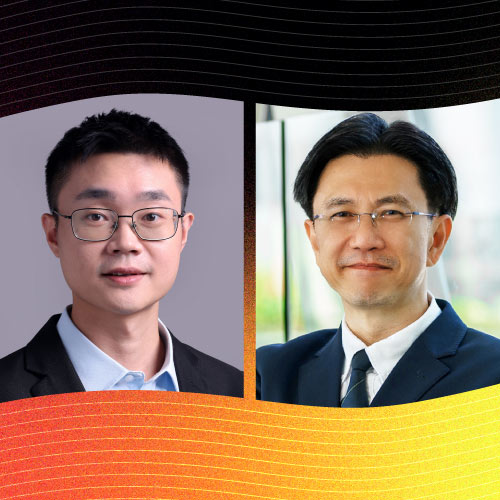Di Zhu Group
Optical photons are natural carriers of quantum information and have led to numerous breakthroughs in quantum communication, networking, sensing, and computation. Despite impressive proof-of-concept demonstrations, implementing practical quantum algorithms requires a new level of complexity, where thousands to millions of optical elements need to be put together. Integrated photonics is likely the only solution.???
Our group aims to develop an integrated photonic platform for scalable quantum information, allowing single-photon generation, control, and detection on a single integrated chip. We rely on two key technologies -- thin-film lithium niobate photonics and superconducting nanowires. The combination of the two will enable novel functionalities and applications such as microwave-optical transduction, single-photon feedforward, as well as advanced multiplexing and encoding schemes for photonic qubits. Our expertise is in nanofabrication, integrated photonics, and applied superconductivity. Beyond integrated quantum photonics, our research extends broadly to nanoplasmonics, superconducting microwave circuits, and classical optoelectronics devices.
We are seeking motivated PhD students and Research Fellows to join our team. If you’re interested, please visit https://www.dizhulab.org/join-us or contact Di directly.
More information at our homepage: https://www.dizhulab.org/


Assistant Professor
Department of Materials Science and Engineering, National University of Singapore
Senior Scientist
Institute of Materials Research and Engineering, A*STAR
Di Zhu received his Ph.D. (2019) and M.Sc. (2017) from Massachusetts Institute of Technology, and B.Eng. (2013) from Nanyang Technological University, all in electrical engineering. From 2019 to 2021, he was a postdoctoral fellow at Harvard University. His Ph.D. thesis focused on superconducting nanowire single-photon detectors, and postdoc work centered around thin-film lithium niobate photonics. In 2021, he returned to Singapore and joined the Institute of Materials Research & Engineering at A*STAR as a research scientist and principal investigator. In September 2023, he joined the National University of Singapore as a Presidential Young Professor while keeping a joint appointment with A*STAR. Di was a recipient of the NRF Fellowship (Class 2023), Harvard Quantum Initiative (HQI) Postdoctoral Fellowship, A*STAR National Science Scholarship, and MIT Jin-Au Kong thesis award. His current research interests include integrated quantum photonics, applied superconductivity, and nanoscale electromagnetics.
Group Members

- Di ZhuCQT Fellow
- Sakthi Sanjeev MohanrajResearch Specialist (A*STAR)
- Sihao WangResearch Scientist (A*STAR)
- Veerendra DhyaniResearch Scientist (A*STAR)
- Xiaodong ShiResearch Scientist (A*STAR)
- Guangxing WuResearch Fellow
- Hao HaoResearch Assistant
- Lin ZhouResearch Assistant
- Jiapeng SunVisiting PhD student
- Ming LuVisiting PhD student
Recent papers

- Sihao Wang, Veerendra Dhyani, Sakthi Sanjeev Mohanraj, Xiaodong Shi, Binni Varghese, Wing Wai Chung, Ding Huang, Zhi Shiuh Lim, Qibin Zeng, Huajun Liu, Xianshu Luo, Victor Leong, Nanxi Li, D.Zhu. (2024). CMOS-compatible photonic integrated circuits on thin-film ScAlN. APL Photonics 9 066109

- Xiaodong Shi, Sakthi Sanjeev Mohanraj, Veerendra Dhyani, Angela Anna Baiju, Sihao Wang, Jiapeng Sun, L.Zhou, Anna Paterova, Victor Leong, D.Zhu. (2024). Efficient photon-pair generation in layer-poled lithium niobate nanophotonic waveguides. Light: Science & Applications 13 282

- Marco Colangelo, Boris Korzh, Jason P. Allmaras, Andrew D. Beyer, Andrew S. Mueller, Ryan M. Briggs, Bruce Bumble, Marcus Runyan, Martin J. Stevens, Adam N. McCaughan, D.Zhu, Stephen Smith, Wolfgang Becker, Lautaro Narváez, Joshua C. Bienfang, Simone Frasca, Angel E. Velasco, Edward E. Ramirez, Alexander B. Walter, Ekkehart Schmidt, Emma E. Wollman, Maria Spiropulu, Richard Mirin, Sae Woo Nam, Karl K. Berggren, Ekkehart Schmidt, Matthew D. Shaw. (2023). Impedance-Matched Differential Superconducting Nanowire Detectors. Physical Review Applied 19 044093

- Evelin Csányi, Yan Liu, Soroosh Daqiqeh Rezaei, Henry Yit Loong Lee, Febiana Tjiptoharsono, Zackaria Mahfoud, Sergey Gorelik, Xiaofei Zhao, Li Jun Lim, D.Zhu, Jing Wu, Kuan Eng Johnson Goh, G.Weibo, Zhi-Kuang Tan, Graham Leggett, Cheng-Wei Qiu, Zhaogang Dong. (2023). Engineering and Controlling Perovskite Emissions via Optical Quasi-Bound-States-in-the-Continuum. Advanced Optical Materials 10 1002

- Dylan Renaud, Daniel Rimoli Assumpcao, Graham Joe, Amirhassan Shams-Ansari, D.Zhu, Yaowen Hu, Neil Sinclair, Marko Loncar. (2023). Sub-1 Volt and High-Bandwidth Visible to Near-Infrared Electro-Optic Modulators. Nature Communications 14 1496
- Yaowen Hu, Mengjie Yu, Neil Sinclair, D.Zhu, Rebecca Cheng, Cheng Wang, Marko LonÄ?ar. (2022). Mirror-induced reflection in the frequency domain. Nature Communications 13 6293
- Mengjie Yu, David Barton III, Rebecca Cheng, Christian Reimer, Prashanta Kharel, Lingyan He, Linbo Shao, D.Zhu, Yaowen Hu, Hannah R. Grant, Leif Johansson, Mian Zhang, Alexander L. Gaeta, Marko LonÄ?ar. (2022). Integrated femtosecond pulse generator on thin-film lithium niobate. Nature 612 258







